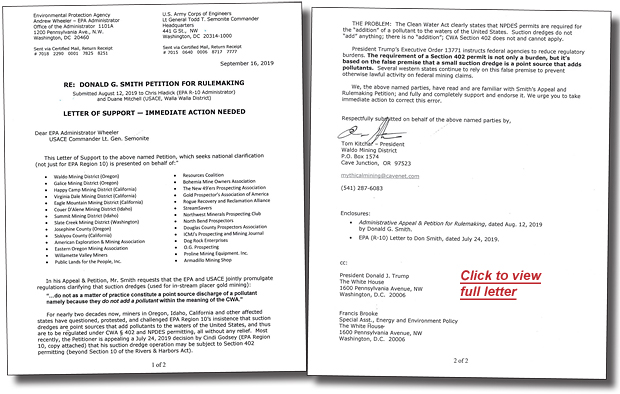Prospecting & Detecting
PLP Update
October 2019 by Scott Harn
As we reported last month, the Environmental Protection Agency (EPA) is attempting to force Don Smith of Idaho to obtain a Section 402 permit for suction dredge mining under the guise of the Clean Water Act. This is despite the fact that the Clean Water Act clearly states there must be the “addition” of a pollutant to trigger the need for such a permit.
Public Lands for the People (PLP) and I assisted Smith with an appeal which included a petition for rulemaking to clarify there is no addition of a pollutant with a suction gold dredge.
Anyone who has ever operated a suction dredge for gold mining is aware that there is no addition of a pollutant. In fact, a suction dredge is an extremely efficient reclamation device that removes pollutants—including heavy metals like lead and mercury—along with any gold the miner might come across, while adding nothing that wasn’t already present in the waterway.
States like California have an agreement with the EPA to handle these types of permits, but if you consent to the permit you would be labelling yourself as a polluter while agreeing to their outrageous conditions and fees. Under the language of the Clean Water Act, there should not be a requirement for a Section 402 permit nor for any similar type of permit issued by a state agency, and we are seeking clarification from the Trump Administration.
Tom Kitchar of the Waldo Mining District learned of Smith’s petition effort from PLP. With a little assistance from PLP and your editor here at the Mining Journal, Kitchar composed a well-crafted letter (shown) to support Smith’s petition for rulemaking. Kitchar also sought the support of additional mining organizations, associations, mining districts, businesses and local governments. All 28 groups listed agree that Section 402 of the Clean Water Act does not apply and no dredge miner should be asking a state or federal agency for such a permit.
We encourage your group or business to join this effort. Please contact us by phone or email and we will help you craft your letter.
Ask The Experts
• Making a noisy dredge more quiet
Lost Sally's Gold
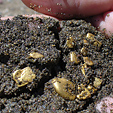 She said a few thoughts did cross her mind at the time; she thought maybe she should have looked more thoroughly for that hand-drawn map to the claim that we had given her the previous year.
She said a few thoughts did cross her mind at the time; she thought maybe she should have looked more thoroughly for that hand-drawn map to the claim that we had given her the previous year.
Scouts New Mining in Society Badge
...it's very refreshing to hear that some of our youth will learn of the value of mining without all the environmental spin.
A Walk Through The Gold Indicators
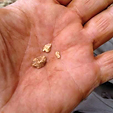 The question that most new people have is, “What do I detect?” Most people have a picture in their mind of what it takes to make what they are seeing a good place to detect. This is what I will try to sort out for you.
The question that most new people have is, “What do I detect?” Most people have a picture in their mind of what it takes to make what they are seeing a good place to detect. This is what I will try to sort out for you.
Ask the Experts
• Using drywashers to work desert gravels
The Basics of Permitting and Bonding Your Mining Operation
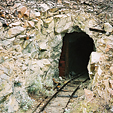 With the recent surge of interest in gold projects, it’s about time to revisit a subject that strikes fear into the hearts of small-scale miners: Permits.
With the recent surge of interest in gold projects, it’s about time to revisit a subject that strikes fear into the hearts of small-scale miners: Permits.
Grizzly Flats, California—Another Mother Lode Gold Rush Town
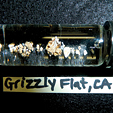 We chatted for a bit and then we had to take off, but I kept what he said in the back of my mind as we rushed out to some other gold-bearing place in the Mother Lode to feed our gold fever.
We chatted for a bit and then we had to take off, but I kept what he said in the back of my mind as we rushed out to some other gold-bearing place in the Mother Lode to feed our gold fever.
Subscription Required:
The Bawl Mill
• Ask The Experts - Do you have more info on Silver Peak?
• Ask The Experts - Forest Service blocking claim access
• Green Valley's Fine Gold Patch
• Hard Rock and Placer Gold of Manhattan, Nevada
• Gold Prospecting for Better or Worse: Powerless
• Revisiting Old Haunts
• How to Refine Silver—Pt II
• Where to Start: Advice for the Beginning Detectorist
• Melman on Gold & Silver
• Mining Stock Quotes and Mineral & Metal Prices
Free:
Legislative and Regulatory Update
• MSHA Moves Ahead on Silica RFI But Leaves All Options Open
• Traders At JPMorgan Chase Indicted For Rigging Metal Prices

